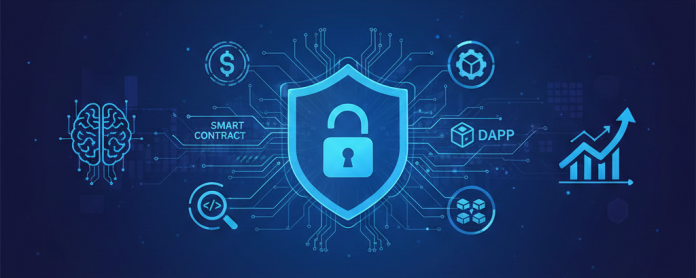In the rapidly evolving landscape of Web3, the success and security of a decentralized application (DApp) hinge entirely on its underlying code — the smart contracts. These self-executing, immutable agreements are the lifeblood of DApps, governing everything from asset custody and financial transactions to governance mechanisms. Consequently, the meticulous process of a smart contract audit is not merely a precautionary step but a fundamental, non-negotiable requirement integrated deeply into the workflow of any reputable DApp development company. This article explores why rigorous auditing is essential, detailing its integration into the development lifecycle and its profound impact on security, trust, and the reputation of DApp development services.
Massive Annual Losses: In 2023 alone, funds stolen from crypto projects totaled approximately $1.7 billion. While this was a decrease from the previous year, the risk remains high, with the number of individual hacking incidents actually rising to 231 (Source: Chainalysis Report). This persistent threat proves the need for continuous vigilance by every Dapp development Company.
The Foundation: Smart Contracts, DApps, and the Imperative of Security
A DApp development company focuses on building decentralized applications that offer transparency, immutability, and censorship resistance, differentiating them from traditional centralized software. The core logic of these applications resides in smart contract development, a process that requires specialized expertise. Unlike conventional software that can be easily updated or patched after deployment, smart contracts, once live on the blockchain, are typically immutable. This permanence is a double-edged sword: it enforces the contract terms with certainty but makes any bugs or vulnerabilities permanently exploitable.
The history of the decentralized finance (DeFi) space is littered with high-profile security breaches, where flaws in smart contract code have led to the loss of billions of dollars. These incidents underscore the immense financial and reputational risk associated with unchecked code. For any DApp development company aiming to deliver reliable and trustworthy DApp development services, a robust security strategy is paramount. This strategy is centered on one key process: the smart contract audit.
Defining the Smart Contract Audit
A smart contract audit is a comprehensive, systematic review of a smart contract’s code by specialized security experts. The goal is to identify and mitigate potential bugs, logical flaws, and security vulnerabilities before the contract is deployed. It’s an adversarial process where auditors essentially think like hackers to find exploitable weaknesses, ensuring that the contract functions exactly as intended and is resistant to known attack vectors.
Also read: Top Smart Contract Audit Tools
Integrating Audits into the DApp Development Workflow
The most effective DApp development company does not view the audit as a final, rushed checkpoint but as a continuous quality assurance process integrated across the entire DApp development lifecycle.
1. Pre-Development Security Planning
Security begins even before the first line of code is written. The DApp development company must establish clear, unambiguous specifications for the smart contract’s intended functionality and tokenomics. This initial documentation phase is critical for the audit. Auditors use these specifications to determine if the implemented code correctly reflects the project’s logic and business requirements. A company like Vegavid, for instance, typically emphasizes this early-stage documentation to ensure a clear alignment between the project’s goals and the technical implementation, streamlining the later smart contract development and auditing phases.
2. The Development Phase: Security by Design
During smart contract development, developers must adhere to established best practices and coding standards. This includes using battle-tested libraries, employing secure design patterns (like Checks-Effects-Interactions to prevent reentrancy), and minimizing the complexity of the code to reduce the surface area for bugs. Internal code reviews and unit testing by the DApp development company’s team are essential preliminary steps. Automated static analysis tools can also be run continuously to catch common, obvious flaws early.
3. The Core Audit: Manual and Automated Review
The official third-party smart contract audit represents the most rigorous security assessment. This phase typically involves a multi-pronged approach:
- Automated Tool Analysis: Specialized tools scan the codebase for known vulnerabilities, gas inefficiencies, and adherence to established standards. While fast, these tools are limited in identifying complex logical flaws.
- Manual Line-by-Line Review: Experienced blockchain security auditors meticulously examine every line of the smart contract code. This is where nuanced logical errors, subtle access control issues, and context-specific vulnerabilities are often uncovered — the types of flaws that automated tools miss. This step is critical for advanced DApp development services.
- Functional and Stress Testing: Auditors deploy the contracts on testnets and perform simulated attacks, including fuzz testing and penetration testing, to see how the contract behaves under extreme or malicious conditions.
4. Remediation and Re-Audit
Following the initial audit, the auditors deliver a detailed report classifying the identified issues by severity (Critical, Major, Minor, Informational). The DApp development company is then responsible for fixing all reported vulnerabilities. This phase demands close collaboration between the development team and the audit firm. Once the fixes are implemented, a re-audit is conducted to confirm that the patches were applied correctly and that no new vulnerabilities were introduced in the process. This iterative approach is a hallmark of professional DApp development.
Also visit : Best DApp development Company in USA
The Business Value of Smart Contract Audits
For a DApp development company, the decision to invest in a comprehensive audit is not just about mitigating risk; it is a vital business and marketing asset that directly influences user adoption and investor confidence.
Vulnerability Reduction: Audited projects were shown to experience approximately 98% fewer hacks than unaudited ones, directly safeguarding user funds and project assets (Source: CoinLaw). This statistic demonstrates the profound effectiveness of the audit process for any Dapp development Company.
Building Trust and Credibility
In the decentralized world, trust is built on verifiable security. An independent audit report serves as a public validation of a project’s commitment to safety and quality. When a project is launched with a clear, public audit from a reputable firm, it instantly boosts user and investor confidence. This trust is crucial for the success of any platform, especially in sectors like DeFi, where assets are at stake.
Risk Mitigation and Financial Protection
The cost of an audit is a tiny fraction of the potential financial loss from an exploit. A single critical bug can lead to the theft of millions in user funds, permanently tanking the project’s reputation and potentially exposing the DApp development company to legal liabilities. Proactive auditing is the most cost-effective form of long-term risk management.
Enhancing Code Quality and Best Practices
The audit process provides invaluable feedback to the smart contract development team. Auditors often highlight inefficiencies, poor coding practices, and ways to optimize gas usage, which leads to cleaner, more maintainable, and cheaper-to-run code. This continuous learning cycle elevates the overall quality of the DApp development services offered by the company.
A Competitive Edge in the Market
In a crowded Web3 space, an audited project stands out. Institutional investors and sophisticated users often refuse to interact with unaudited contracts. For a Dapp development Company like Vegavid, which aims to be a leader in the space, providing audited solutions is a key differentiator. Their focus on end-to-end DApp development services, from ideation to secure deployment, is anchored by their commitment to rigorous security protocols, ensuring their clients’ projects are not only functional but also fortified against exploitation. This commitment is a prerequisite for success in the modern blockchain economy.
Key Vulnerabilities Addressed by Auditing
A smart contract audit scrutinizes the code for a vast array of potential weaknesses. Some of the most common and devastating vulnerabilities include:
- Reentrancy Attacks: A flaw where an external call can recursively call back into the original contract, often draining its funds. Famously exploited in the DAO hack.
- Integer Overflow/Underflow: Mathematical operations that exceed the maximum or fall below the minimum storage capacity of a variable, leading to unexpected and exploitable results.
- Access Control Flaws: Issues where critical functions (like withdrawing funds or upgrading the contract) can be executed by unauthorized users.
- Front-Running: Attacks where a malicious actor observes a pending transaction and submits a competing transaction with a higher gas fee to execute their action first, often exploiting decentralized exchange mechanics.
- Denial-of-Service (DoS) Attacks: Vulnerabilities that allow an attacker to disrupt the contract’s normal operation, preventing legitimate users from interacting with it.
Identifying and fixing these issues is the central purpose of the audit, turning a fragile piece of code into a reliable foundation for decentralized trust.
The Future of DApp Development and Security
As DApp development becomes more complex, integrating technologies like Layer-2 scaling solutions, cross-chain bridges, and sophisticated DeFi protocols, the criticality of smart contract audits will only intensify. The audit process itself is evolving, moving towards continuous auditing models and incorporating formal verification — a mathematical method to prove the code’s correctness against its specification.
For any professional DApp development company, maintaining a strong security culture means staying ahead of emerging attack vectors and consistently applying the latest security standards. This continuous commitment to security is what separates successful, long-lasting DApp development services from short-lived, exploited projects. Building in Web3 means building with an unshakeable focus on immutable code security.
In conclusion, the role of smart contract audits is transformational: it shifts the development process from a code-and-deploy model to a secure-by-design framework. For any DApp development company looking to build credible, enduring applications, a rigorous smart contract audit is the final, essential seal of security and a public declaration of competence in smart contract development.
Also read: The Future of DApp Development: Trends Shaping Web3 in 2026
Ready to fortify your decentralized application with industry-leading security?
Schedule a free consultation with Vegavid today!
Frequently Asked Questions (FAQ)
1. What is the fundamental difference between a Smart Contract Audit and standard code testing?
A smart contract audit goes far beyond standard unit testing or quality assurance (QA). Standard testing verifies that the code functions as intended (e.g., “does the transfer function move tokens?”). An audit, particularly in the context of professional Dapp development services, is an adversarial process that verifies that the code cannot be exploited in unintended ways (e.g., “can an attacker use the transfer function to drain all tokens or exploit a reentrancy vulnerability?”). Auditors think like hackers to ensure robust security for the entire Dapp development ecosystem.
2. When in the Dapp development lifecycle should the smart contract audit be performed?
The formal, external audit should be performed once the smart contract development is complete and the code is “frozen” (no more changes are made). However, security should be integrated from the beginning. A reputable Dapp development Company will conduct internal security reviews, formal verification, and automated scanning throughout the development process. The final third-party audit is the non-negotiable step before deployment to the mainnet.
3. How long does a typical smart contract audit take?
The duration depends heavily on the complexity and size of the codebase. A simple ERC-20 token contract might take only 3 to 7 days, while a complex DeFi protocol involving multiple interacting contracts (common in advanced Dapp development) can take 2 to 6 weeks or even longer. The process includes the initial review, the remediation phase by the Dapp development Company, and a final re-audit to verify the fixes.
4. What happens if vulnerabilities are found during the audit?
If vulnerabilities are found, the auditors categorize them by severity (Critical, High, Medium, Low, Informational). The audit firm then provides a detailed report with specific recommendations for remediation. The Dapp development Company is responsible for fixing these issues. A re-audit is then conducted to confirm that the patches were applied correctly and that no new issues were introduced, ensuring the quality of the Dapp development services provided.
5. Why can’t automated tools fully replace manual auditing for Dapp development?
Automated tools are excellent for quickly identifying common and well-known vulnerabilities (like basic reentrancy or integer overflows). However, they cannot assess complex business logic errors or design flaws that are unique to the project’s architecture. Only an experienced human auditor can meticulously review the context of the code, compare it against the project specifications, and anticipate complex, multi-step attacks. A comprehensive smart contract development audit always utilizes a hybrid approach.



